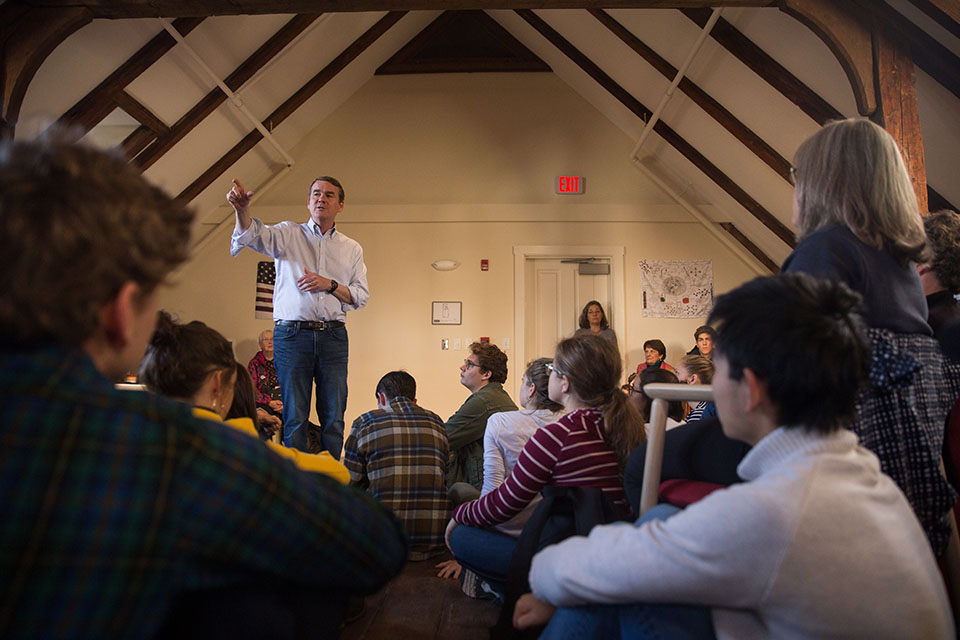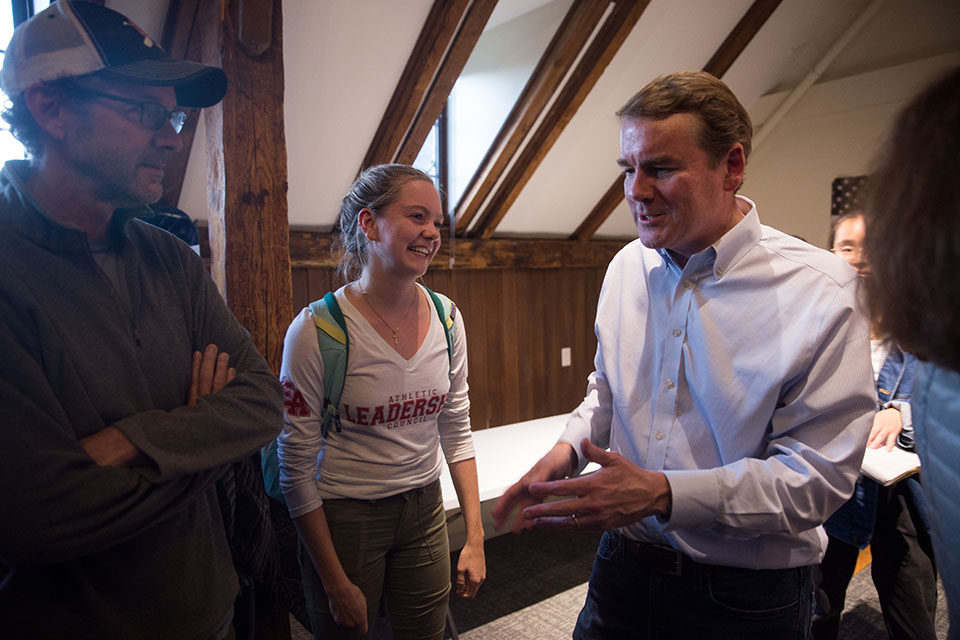Presidential candidate Bennet speaks at Bowdoin
November 1, 2019
Like most visiting for Family Weekend, presidential candidate and United States Senator Michael Bennet (D-CO) P’23 spent the weekend eating brunch at Thorne, exploring campus and spending time with his family.
Unlike other visiting parents and family members, Bennet spent Saturday afternoon answering questions about national issues and his presidential campaign from a crowded room of parents, students and Brunswick residents—among whom was Senator Angus King (I-ME)—during a town hall in Chase Barn.
Bennet has represented Colorado in the Senate since 2009. Before running for Senate, he served as the Superintendent of the Denver Public Schools which serves 95,000 students. Bennet is currently polling at less than one percent in most national polls.
In January, Bennet drew national attention after an impassioned, impromptu speech on the Senate floor where he accused Sen. Ted Cruz’s (R-TX) of “crying crocodile tears.”
Topics discussed at the question and answer session included climate change, education and healthcare.
Halfway through the town hall, Bennet caught sight of King seated behind him. In a moment of excitement, the two, who sit on the Senate Intelligence Committee together, embraced and Bennet invited the Senator to answer questions with him.
“It was fun that Angus King showed up. I appreciated that. I wasn’t expecting that,” Bennet said in an interview with the Orient. “It was fun to have the opportunity to hear his answers as well.”
Together, the duo fielded questions including one regarding the current impeachment investigation of President Donald Trump.
King answered by stating he is a conservative when it comes to impeachment, meaning he believes that it should not be done because a party disagrees with the policies or personality of the President. King explained he does not yet have a verdict on the situation because he will be a juror if the inquiry goes to Senate. However, King does not see political dissonance as the motive for impeachment.
“It came to the point when I read the transcript of that telephone call, where the President of the United States essentially asked the foreign leader to intervene in our election—in his reelection,” King said. “I just felt as a public guy who took an oath to defend the constitution, I can’t look the other way.”
As for his personal politics, Bennet is a self-described “pragmatic idealist.” Bennet calls himself pragmatic because he has little patience with Washington’s “ideological partisan shooters” who are not focused on solutions for working class people.
“I know how hard kids are working in the Denver Public Schools, under incredibly adverse circumstances, to get into a position to make a difference in this democracy,” Bennet said. “Every single time [partisans] are wasting their time. It really makes me mad.”
The idealist in him, Bennet says, believes wholeheartedly in American democracy.
“I think we are the last best hope on earth in terms of freedom and democracy, as imperfect as our example has been,” Bennet said.
In an increasingly left-leaning democratic primary, Bennet said his “pragmatic idealism” is viewed—in comparison to candidates such as Elizabeth Warren and Bernie Sanders—as “moderate.”
“I think I have very progressive agenda. I really do,” Bennet said. “It is very different than Bernie’s and Elizabeth.”
Bennet pointed out his plan to reduce childhood poverty by increasing the child tax credit and the earned income tax credit as well as implementing family leave.
Anna Martens ’20, who is from Denver, remembers Bennet from when he was the superintendent of her school district. She says although she saw him on numerous other occasions, last weekend’s Q&A—2,000 miles from her and Bennet’s hometown—was unique because of the casual nature of the conversation.
“It was nice to get that viewpoint and that intimacy on campus,” Martens said.
Bennet’s office reached out to the Bowdoin College Democrats—the organizers and sponsors of the event—to see if there was interest on campus for a Q&A.
“I wanted it to be less a campaign event and more of an opportunity for people to ask questions—that’s how I learn what people are interested in,” Bennet said.
Attendees also felt that the conversation encouraged discourse on “hot-button” political issues.
“I appreciated that there was a back and forth between the crowd and himself,” Morgan Edwards ’22 said. “I think that’s great. We should be encouraging civil, respectful discourse in the political circles. And I think that was a prime example of that occurring.”



Comments
Before submitting a comment, please review our comment policy. Some key points from the policy: